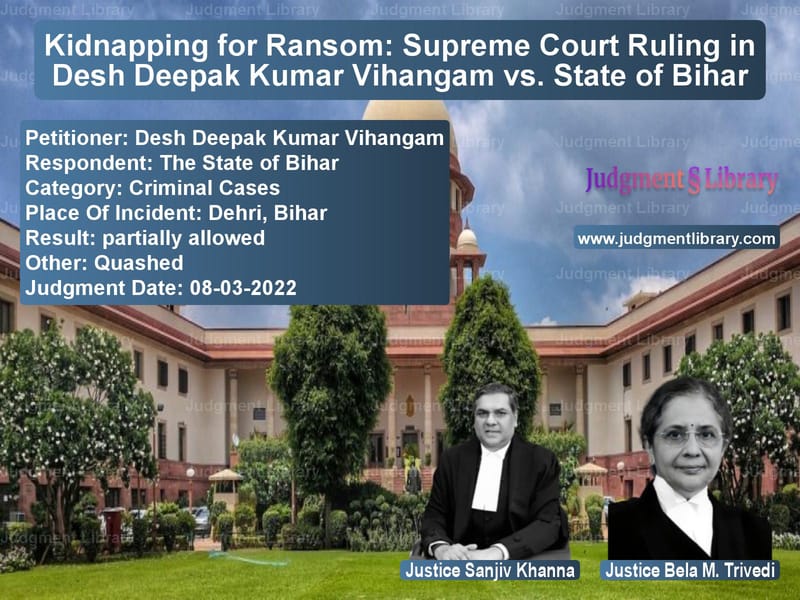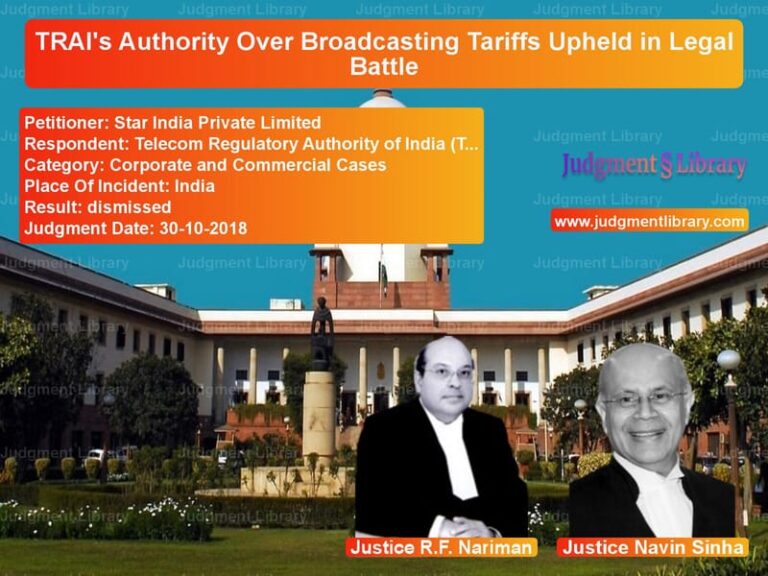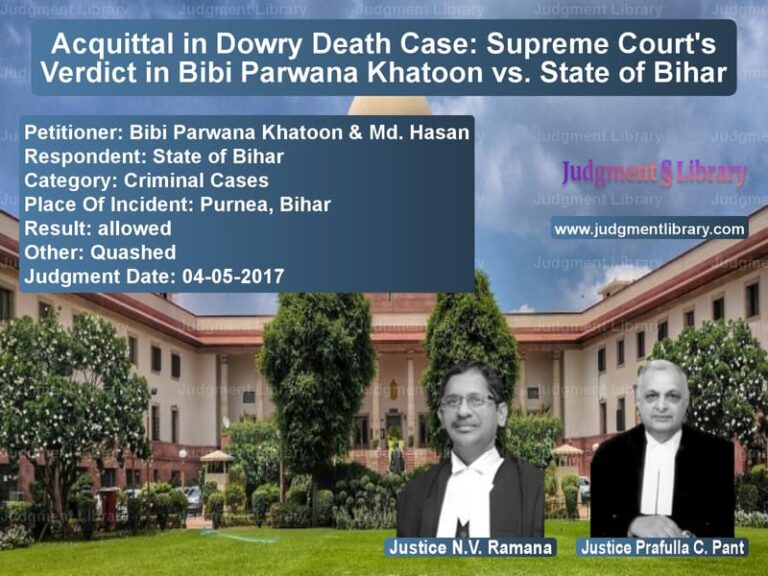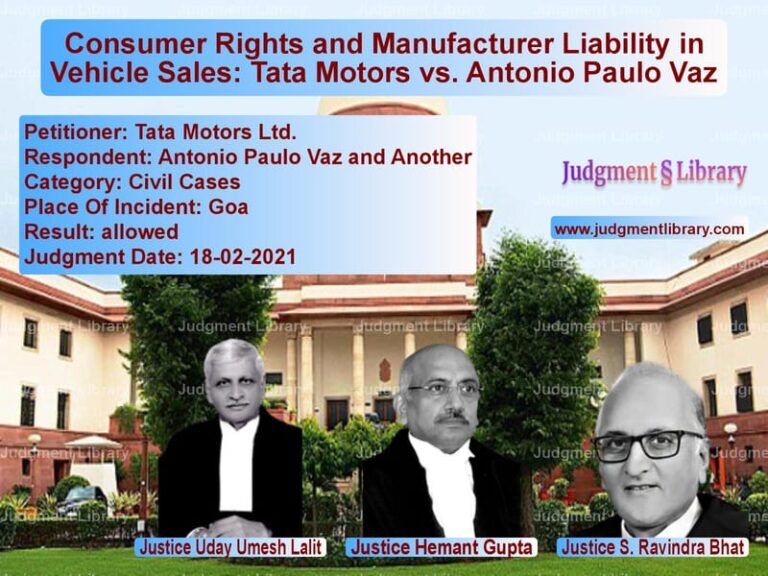Kidnapping for Ransom: Supreme Court Ruling in Desh Deepak Kumar Vihangam vs. State of Bihar
The case of Desh Deepak Kumar Vihangam vs. The State of Bihar revolves around a shocking case of kidnapping for ransom. The Supreme Court had to determine the guilt of multiple accused persons involved in the abduction of a doctor and his driver, and whether their convictions under Sections 364A (Kidnapping for Ransom) and 120B (Criminal Conspiracy) of the Indian Penal Code (IPC) were justified.
Background of the Case
On February 7, 2006, Dr. Shashi Kumar Sinha, a well-known doctor, was abducted along with his driver, Salauddin, while traveling from his residence at Station Road, Dehri, to his clinic at Tilouthu Village. The kidnappers initially demanded a ransom of Rs. 1 crore but later reduced the demand to Rs. 12 lakh.
Dr. Sinha’s son, Dr. Amitabh Sinha, arranged the ransom payment of Rs. 12 lakh, which was handed over to Deepak Kumar in Ranchi on February 24, 2006. Later, on March 9, 2006, the kidnappers demanded an additional Rs. 5 lakh. Dr. Amitabh Sinha, with the help of the police, traveled to Patna for the second ransom payment.
The police, tracking the ransom exchange, arrested two accused—Deepak Kumar and Kanhaiya Lal—on March 10, 2006. Following their interrogation, the police raided a house in Village Bar, Aurangabad, and rescued Dr. Sinha and Salauddin. Several other accused were arrested at the house.
Petitioner’s Arguments (Desh Deepak Kumar & Others)
The accused presented the following arguments:
- They had no involvement in the kidnapping.
- The prosecution had not produced concrete evidence linking them to the conspiracy.
- Some of them were arrested based on mere suspicion, without direct evidence of their participation.
- The money recovered from Deepak Kumar was insufficient proof of his role.
Respondent’s Arguments (State of Bihar)
The prosecution countered with the following arguments:
- Dr. Amitabh Sinha (PW-1) had positively identified Deepak Kumar as the recipient of the ransom money.
- Deepak Kumar’s confession led to the rescue of the kidnapped victims.
- The police recovered Rs. 6 lakh from Deepak Kumar’s premises, with some currency notes bearing the signatures of Dr. Amitabh Sinha.
- Eyewitnesses and forensic evidence confirmed the accused’s involvement in the conspiracy.
Supreme Court’s Observations
The Supreme Court examined the evidence in detail. Regarding the main accused, the Court stated:
“In view of the aforesaid facts, and the appreciation of evidence, we hold that the conviction of Bimlesh Kumar, Madan Prasad Thathera, and Deepak Kumar is correct. We are in agreement with the findings and conclusions of the trial court and the High Court in this regard.”
However, for other accused such as Kanhaiya Lal, Ramjee Prajapati, and Abhay Kumar, the Court found a lack of direct evidence and gave them the benefit of the doubt.
Final Judgment
The Supreme Court made the following key rulings:
- The convictions and sentences of Desh Deepak Kumar, Bimlesh Kumar Singh, and Madan Prasad Thathera were upheld.
- The appeals of Kanhaiya Lal, Ramjee Prajapati, and Abhay Kumar were allowed, and their convictions were set aside.
- Deepak Kumar, who was out on bail, was directed to surrender within 10 days to serve his life sentence.
Key Takeaways from the Judgment
- Kidnapping for Ransom is a Heinous Crime: The judgment reinforces the seriousness of kidnapping for ransom, with life imprisonment being the standard punishment.
- Role of Direct and Circumstantial Evidence: The Court carefully examined both direct evidence (such as ransom payments) and circumstantial evidence before arriving at its decision.
- Benefit of the Doubt: Where concrete evidence was lacking, the accused were given the benefit of the doubt and acquitted.
- Police Coordination in Ransom Cases: The case highlights how law enforcement agencies track ransom payments and use them to locate victims.
Conclusion
This judgment serves as a strong precedent in cases of kidnapping for ransom. It shows that while courts uphold strict penalties for those directly involved, they also ensure that convictions are based on solid evidence. The Supreme Court’s detailed analysis ensured that justice was served both for the victims and the wrongly accused.
Petitioner Name: Desh Deepak Kumar Vihangam.Respondent Name: The State of Bihar.Judgment By: Justice Sanjiv Khanna, Justice Bela M. Trivedi.Place Of Incident: Dehri, Bihar.Judgment Date: 08-03-2022.
Don’t miss out on the full details! Download the complete judgment in PDF format below and gain valuable insights instantly!
Download Judgment: desh-deepak-kumar-vi-vs-the-state-of-bihar-supreme-court-of-india-judgment-dated-08-03-2022.pdf
Directly Download Judgment: Directly download this Judgment
See all petitions in Bail and Anticipatory Bail
See all petitions in Fraud and Forgery
See all petitions in Attempt to Murder Cases
See all petitions in Extortion and Blackmail
See all petitions in Money Laundering Cases
See all petitions in Judgment by Sanjiv Khanna
See all petitions in Judgment by Bela M. Trivedi
See all petitions in partially allowed
See all petitions in Quashed
See all petitions in supreme court of India judgments March 2022
See all petitions in 2022 judgments
See all posts in Criminal Cases Category
See all allowed petitions in Criminal Cases Category
See all Dismissed petitions in Criminal Cases Category
See all partially allowed petitions in Criminal Cases Category







